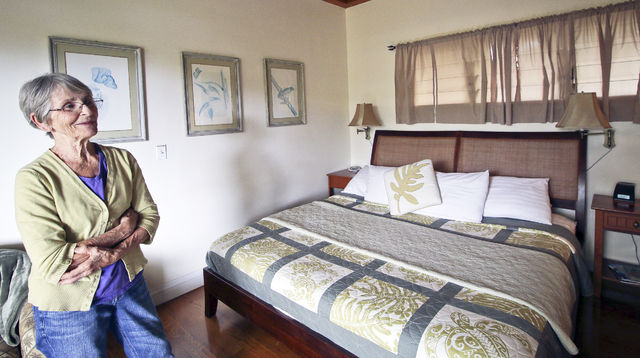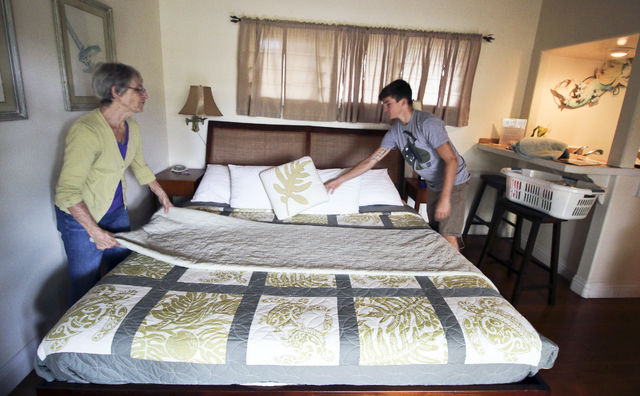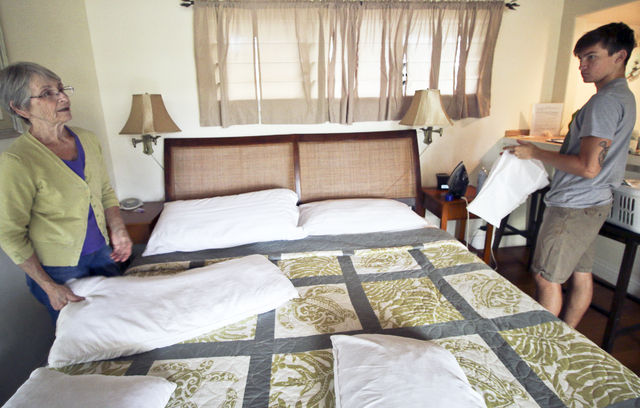LIHUE — Lorna and John Hoff have run the Kauai Banyan Inn in Lawai for years, but now they’re doing so with a surprising twist.
Guests have been staying for free since the county shut down the bed-and-breakfast for operating without a permit.
“I don’t feel that it was right for me to tell them, ‘No you can’t come,’ because this is something they booked a year or two ago and might have saved their whole lives for,” Lorna Hofff told The Garden Island last week. “So I just called them and told them that you are welcome to come and stay for free. I was very pleased that the Planning Department said I could do that.”
Among the guests are a Canadian couple visiting Kauai to celebrate their 40th wedding anniversary, and a German family who traveled halfway across the globe.
The Hoffs are among several vacation accommodation providers on Kauai who are trying to navigate through a difficult and murky process to gain the right to legally run their businesses, ever since the county cracked down on unpermitted B&B establishments and other Transient Vacation Rentals across the island.
The Hoffs want to get properly permitted so they can continue operating their business. But working through the process is difficult, she said.
Besides letting guests stay in the house, they — and others — have hired an attorney to help them through the permitting process.
“This is already extremely stressful, but we felt it would be more stressful if we didn’t hire an attorney,” Hoff said. “He’s familiar with the permit process — it makes you feel a little more confident.”
The Hoffs aren’t alone.
Darcy Summer is another operator who has sought legal help.
As the owner of Mohala Ke Ola Management, LLC, she’s run Secret Falls Retreat since she bought the property in 2011. And as one of the first to submit a permit application since the county started cracking down on unpermitted B&B owners, she decided it was best to hire an attorney to help with the process.
“It sounded extremely complicated,” Summer said. “It was apparent that it was a difficult process and I wanted to make sure I got it done right.”
But hiring an attorney is expensive. Summer estimates that she’s already spent at least $7,000 on legal and permit fees.
Legal costs
For B&Bs seeking permits, costs can run into the thousands.
Application fees by themselves, depending on the type of operation, start in the hundreds of dollars. Legal fees add to that.
Jonathan Chun is an attorney helping operators navigate through a process the county is still trying to work out.
Chun, who served as legal adviser for the Planning Commission when he worked for the County of Kauai in the 1990s, is a private attorney representing several B&B owners who are applying for permits so they can resume operations after being served cease-and-desist letters by the county.
“I tell all my clients, you better have enough parking on your property — that’s a legitimate issue that impacts the neighborhood,” he said.
Chun has filed nine permit applications on behalf of his clients, and anticipates that he will represent several more.
But it isn’t necessary to hire an attorney, he said — a comment with which the county agreed. But Chun recommended it.
The checklist for a permit application is four pages long, and requires information such as documents verifying ownership, a location map identifying the site, adjacent roadways and identifying landmarks, site schematics or plot plans, a description of proposed use, detailed land use history, analysis of secondary impacts of the proposed use, sewage and solid waste disposal analysis, and a description of environmentally sensitive areas.
“It’s a difficult process in that the ordinance requires a lot of detail that is not common knowledge and it is very difficult to find that information to put in your application. The Planning Department is good to work with. It can be done, but it’s frustrating,” Chun said.
County enforcement
Legal representation isn’t necessary, county officials maintain.
The county undertook an enforcement measure beginning around two years ago. Concerns from the community about maintaining neighborhood and zoning integrity resulted in 93 cease-and-desist letters that were mailed out in a first round of enforcement, with more expected to come, thought a final number hasn’t been estimated. Those letters said the operators must be compliant with the law, otherwise they can’t run their business.
Planning Department Deputy Director Kaaina Hull stressed that the vast majority of those who received notices, which gave owners two weeks to shut down or face $10,000-a-day fines, are illegal Transient Vacation Rentals (TVRs) operating outside of designated zones without a permit. But he acknowledged that also caught in the sweep were a small number of B&B owners who are Kauai residents that have been properly paying taxes and renting out spare rooms either as a source of income or to be able to afford their home.
“The overall intent was to go after the illegal TVR operators,” Hull said, adding the Planning Department cannot selectively enforce the law, which means that once it was aware of violators who were operating without a permit, it had an obligation to shut them down.
But, Hull said, he does not believe it is necessary to hire an attorney. The department will work with all applicants to get their application up to par to be reviewed by the Planning Commission.
“In no way, shape or form is an attorney required,” he said.
But another wrinkle is the fact that the county is considering capping the number of permits it reviews to become legal operators at 10 per year — though one council member said that’s far from a done deal. If the council decides to cap the number of reviews at 10, it would review them on a first come, first served basis. That means, of the hundreds of operators who have been running under the status quo, only a handful would be considered each year.
So plenty of businesses who want to play by the rules would — best-case scenario — have to wait. In the worst-case scenario, they would have shut down for good because of the lost income. And, some operators point out, there’s already plenty of lost revenue.
Financial impact
Hoff has already felt the economic impact. Her guests, whom she declined to allow TGI to interview, are staying for free. She said she didn’t want to think about what would happen if the couple’s permit is denied, which would require them to change their financial course.
“I’m trying to be very optimistic and say I will get it,” Hoff said, adding that if they were denied they would consider moving, although that would be very difficult because they have kids and grandchildren living on the same road.
“It’s not like you make a fortune. It’s what you try to do to stay here on this beautiful island,” Hoff said.
That thought was echoed by Summer, who said she doesn’t run her B&B to make a profit — she does it so her family can afford to live on Kauai.
And if she can’t get a permit?
“I don’t think we’d stay,” she said. “I just don’t think we could. The expenses are just too high.”
The conversation on the county’s enforcement measure has been polar. Some letters to the editor received by TGI are from visitors have said they had to change plans since they were told their planned accommodations weren’t legal — pointing out in dollar amounts how much they plan to spend on other islands instead.
But Hull said any potential financial ramifications haven’t been crunched by the county as it tries to enforce a law fairly across the books.
“We haven’t crunched any numbers on that,” Hull said.
What the county is considering
The County Council is considering a proposal to amend the original definition of homestay in order to ensure that the owner actually resides onsite. This means, adding to the definition of homestay, that the guest accommodations must be within the same dwelling unit in which the owner resides or in a guest house, and that it must be the owner’s primary residence, and that the owner currently qualifies for a homeowner’s exemption.
The impetus to change the definition is because many illegal TVR operators have realized that the limited definition of a homestay and lack of associated standards serve as a possible loophole to get qualified as a B&B.
There will be a public hearing on this issue May 19 at 1:30 in the council chambers of the Historic County Building.
Councilwoman JoAnn Yukimura said she is concerned with the proposed cap of reviewing 10 applicants a year.
“I think a cap of 10 is pretty arbitrary and I will be looking for another way to determine the number of bed-and-breakfasts that would be allowed to operate on the island,” she said.
Yukimura stressed the need to treat B&B owners separately from other kinds of vacation rentals. One of the reasons the issue came to light is because people were advertising their homes online as places for visitors to stay without having the permitting. Sometimes people who own property on Kauai rent out their places without actually living here.
“The owners of these bed-and-breakfasts are residents, they are part of our community,” Yukimura said, adding that the difference is that B&Bs have an owner living on-site who can be held accountable.
But with a stand-alone vacation rental, “sometimes they are wonderful guests, sometimes they are noisy and cause problems, but it’s hard to address the issue if you’re a neighbor,” she said.
“I feel very badly about this situation where ongoing businesses have been shut down, and I hope we can address it as quickly as possibly because I recognize that it’s a very difficult situation,” Yukimura said.
Mayor Bernard Carvalho Jr. said he, too, is concerned with the prospect of businesses shutting down.
“I am concerned about the livelihood of our residents that own B&Bs, and I hope that a solution is found soon,” he said in an email. “For now, we need to allow the process to continue with the bill being discussed by the County Council. I’d like to hear from all sides before making a decision.”
Previous rules?
Some operators said that, even before the recent enforcement, the permitting process was confusing and inconsistent.
One of those operators is Eddi Henry.
In 2006, she purchased a home specifically to develop a B&B. After meeting the owner of Gloria’s Spouting Horn Bed & Breakfast, and hearing about the controversy surrounding stand-alone TRVs, she decided it would be best to get a permit of her own.
“I went into the county Planning Department to ask if there was a use permit which I could apply for, and they gave me the application and I turned it in,” Henry said.
But that’s as far in the permit process as she got, she said.
“They never knew what to do with it, and never processed it,” she said, adding that the completed application was eventually given back to her. She has been operating The Palmwood in Moloaa since 2007 without a permit.
Henry said that she has followed up several times over the years since, but was always turned away. “They continually said there was no process in place, but that it was coming down the pipeline and would be coming,” she said.
But unlike other B&B owners who were operating without a permit, Henry did not receive a cease-and-desist letter from the county.
Hull said that he is aware of Henry’s claim but he could not speak to her past experience, and that to his knowledge no one seeking to apply for a homestay/B&B use permit was ever turned away.
The county, meanwhile, is still looking into potential permit violations and hasn’t sent out all the cease-and-desist letters yet.
According to a list provided by the county, a total of only nine homestay permits have ever been granted permits. Homestay is the legal term for what is commonly referred to as a bed-and-breakfast or B&B. The first of those permits was issued in 1989 and the most recent was issued more than a decade ago, in 2004. All nine have since closed, meaning that by the letter of the law, there is not a single legal B&B operating on the island today.
Hull said the county is confident in its interpretation that permits are required by law, and the very fact that permits were previously issued, “attests to the fact that we are in fact requiring permits for homestay operations.”
Gabby Taylor was one of the those who was granted a permit, although she closed her B&B in 2000 because she wanted to travel more.
Taylor said she got the B&B permit after the vice squad busted her for running a retreat center in the early 1990s.
They closed her down, but she said they told her she could get a permit to open a B&B. Taylor later wrote about the experience of getting a permit in her book “Geckos & Other Guests: Tales of a Kauai Bed & Breakfast.”
“There was no process for getting a permit — they just made it up,” Taylor said.
Taylor said she was later asked to serve on an advisory committee with five other B&B owners to make recommendations about how to regulate B&Bs and establish a permit process.
“They never did anything with it,” she said.
What’s next?
Alexis Boilini, owner of Marjorie’s Kauai Inn, said she thinks permits are a good thing.
“I don’t think anyone in the B&B business is against having permits — we’ve all wanted them for years,” Boilini said. “That puts you under a national umbrella so you can get referrals from all over the world.”
Boilini, who previously operated a B&B in North Carolina before moving to Kauai 12 years ago, said she, too, was turned away when she tried to apply for a permit, and didn’t think about the issue much until she received a cease-and-desist letter telling her that her business was illegal.
She has also hired Chun to be her attorney for better representation as she navigates through the quagmire. She estimated she will spend at least $7,000 in legal and permit fees, but is moving forward because she wants the business to continue.
“I chose to go through a lawyer because I’m too big of an operation to risk not getting a permit, but what about people who can’t afford that? This should be an over-the-counter process,” Boilini said.







